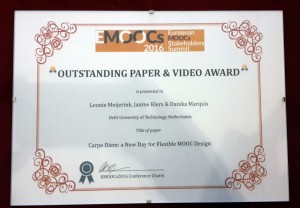Posts tagged course design
Using peer assessment in inclusive digital education
Article written by G. Saunders-Smits, G. van Helden, V. van der Werf, M. M. Specht and published in the Proceedings of the 50th Annual Conference Universitat Politècnica de Catalunya · BarcelonaTech (UPC).
Abstract
This workshop is part of the ERASMUS+ project: RAPIDE: on Relevant Assessment and pedagogies for Inclusive Digital Education (https://rapide-project.eu) and is open to anyone who is interested in implementing or improving peer assessment in their courses. At the end of the workshop, participants will be able to make an informed decision on a suitable form of Peer Assessment for their courses. Over the past few years, many of us have faced operating in a frequently changing teaching environment which has made evaluating and assessing students’ learning outcomes and more importantly giving students feedback on their learning much more complicated. One pedagogical tool that has been increasingly used is that of peer assessments where students give each other feedback and assess each other’s work. In this workshop, participants will be introduced to many different types of peer assessment that can be used in engineering education, such as peer reviewing (each other’s work), peer grading(continuous feedback on mastery), and peer evaluation (group work) whether face-to-face, hybrid or in a fully online environment and how to do so in an inclusive way thus maintaining the important safe place that education should be. Participants will then in small groups discuss what types of peer evaluations they use or want to use in their courses and brainstorm on ideas for implementation in their own specific case or for one of the general cases that the facilitators will have available. At the end of the workshop participants will present their main findings back to the whole group so that they may also learn from each other. We aim for participants to leave feeling inspired at the end of the workshop to implement or improve peer assessment in their own courses. The aggregated main findings and ideas contrived in the workshop on how to implement peer assessment will also be shared with a wider audience through the conference proceedings and the RAPIDE project website.
Keywords
Focus groups, course design, team based learning, project based learning, learning technology
Reference
Saunders-Smits, G., van Helden, G., van der Werf, V., & Specht, M. M. (2022). USING PEER ASSESSMENT IN INCLUSIVE DIGITAL EDUCATION. In H-M. Jarvinen, S. Silvestre, A. Llorens, & B. V. Nagy (Eds.), Proceedings of the 50th Annual Conference Universitat Politècnica de Catalunya · BarcelonaTech (UPC) (pp. 2305-2308). (SEFI 2022 – 50th Annual Conference of the European Society for Engineering Education, Proceedings). https://doi.org/10.5821/conference-9788412322262.1369
Download
EMOOCS2016: Carpe Diem: a new day for flexible MOOC design
Paper presented at the EMOOCs 2016 conference in Graz, Austria. The paper was awarded the outstanding paper & video award.
Abstract
Is there one approach to course design that can be recommended in engineering education? At Delft University of Technology (TU Delft), we designed and developed 25 MOOCs, and our experience and expertise in course design is advancing.
One of the frequently used approaches for supporting course teams was inspired by the Carpe Diem approach (Salmon 2014). This paper discusses the experience of TU Delft in implementing this methodology in an engineering setting in MOOCs. The reason for choosing the Carpe Diem approach is that it is simple to use, supports constructive alignment and is a team based approach. In the approach a more activity-based design of MOOCs is promoted through developing e-tivities. In this article the experiences of e-learning developers are described in supporting ten course teams (5 online courses and 5 MOOCs) using the Carpe Diem approach. Two main challenges in supporting course teams are highlighted;
I. How to introduce course teams to the value of the methodology and
II. How to ensure that the specific characteristics of a MOOC are embedded in the design.
For both challenges a range of ‘proposed solutions’ is suggested based on the experiences of the e-learning developers. This results in lessons learned that can be applied by anyone who would like to make use of the Carpe Diem approach for flexible MOOC design. This paper argues that the Carpe Diem approach needs to be used in an interactive and flexible way, taking into account the diversity of the course teams and course leaders as well as the special characteristics of a MOOC.
Reference
Meijerink, Leonie; Kiers, Janine; Marquis, Danika (2016). Carpe Diem: a new day for flexible MOOC design. In Proceedings of the EUROPEAN STAKEHOLDER SUMMIT on experiences and best practices in and around MOOCs (EMOOCS 2016). http://emoocs2016.eu/wp-content/uploads/2016/02/proceedings-emoocs2016.pdf. ISBN 9783739237107 (page 425-438)
Video
Slides
Paper
Paper is part of the conference proceedings (page 425-438)

